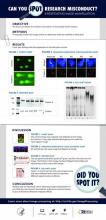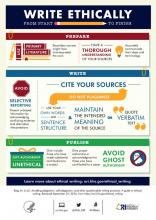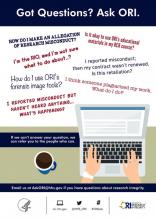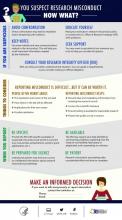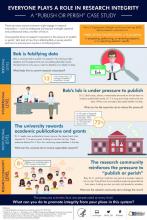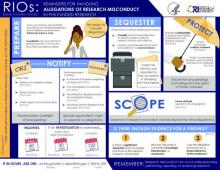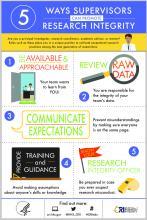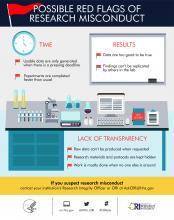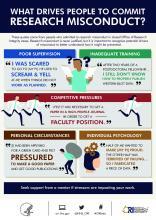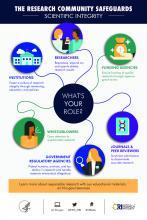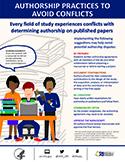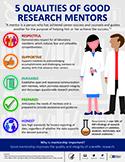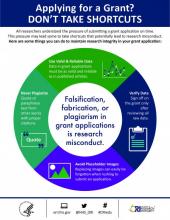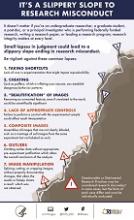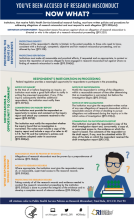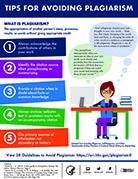Infographics
The Office of Research Integrity (ORI) has developed a series of infographics addressing the Responsible Conduct of Research and the handling of research misconduct. These infographics can be used by RCR instructors and Research Integrity Officers (RIOs) to help educate the community on research integrity topics. ORI encourages the sharing and distribution of these resources with colleagues.
- Can You Spot Research Misconduct?
Summary: This research misconduct "quiz" is formatted like a scholarly paper where viewers can test their ability to detect research misconduct in a sample "Results" section.
Theme(s): Image processing; Data management; Research misconduct; Whistleblowing.
- Tips for Presenting Scientific Images with Integrity
Summary: This infographic provides viewers with three tips for presenting scientific images with integrity and three things to avoid when processing images.
Theme(s): Image processing; Data integrity; Avoiding Questionable Research Practices.
- Write Ethically from Start to Finish
Summary: This infographic presents tips for ethical writing. The content was drawn from ORI's module on avoiding plagiarism created by Dr. Miguel Roig.
Theme(s): Plagiarism; Responsible authorship.
- Got Questions? Ask ORI.
Summary: This infographic is intended to encourage the general research community to contact ORI with questions or concerns about research integrity.
Theme(s): Contacting the U.S. Office of Research Integrity.
- You Suspect Research Misconduct. Now What?
Summary: Reporting research misconduct can be one of the toughest decisions a potential whistleblower can make. This infographic provides some considerations and tips before making an allegation of research misconduct.
Theme(s): Reporting research misconduct; Whistleblowing.
- Everyone Plays a Role in Research Integrity
Summary: This visual case study follows "Bob" a hypothetical postdoc working in "Dr. C's" lab as they struggle with the pressures of "publish or perish." This infographic is intended to show the different pressures facing the research community at various levels of the scientific ecosystem.
Theme(s): Scientists as responsible members of the research community; Publish or Perish; Preventing Research Misconduct.
- RIOs: Reminders for Handling Allegations of Research Misconduct in PHS-Funded Research
Summary: This infographic highlights key points from ORI's regulation related to handling allegations of research misconduct.
Theme(s): Handling research misconduct allegations.
- Research Trainees: What You Should Know about Research Misconduct
Summary: Research misconduct isn't a topic that most graduate students or postdocs consider while in training. This infographic presents six facts about research misconduct that researchers should know early in their careers.
Theme(s): Whistleblowing; Preventing research misconduct; Research training.
- 5 Ways Supervisors Can Promote Research Integrity
Summary: This infographic presents supervisors with five things they can do to promote integrity in their labs or research groups.
Theme(s): Mentor/mentee responsibilities and relationships.
- Possible Red Flags of Research Misconduct
Summary: This infographic emphasizes some possible red flags of research misconduct. These factors do not necessarily mean research misconduct is occurring but should be considered warning signs that something might be going on in the lab.
Theme(s): Preventing research misconduct; Data acquisition,management, sharing and ownership.
- What Drives People to Commit Research Misconduct?
Summary: Using quotes from closed ORI cases, this infographic emphasizes factors that can push people to commit research misconduct.
Theme(s): Scientists as responsible members of the research community; Preventing research misconduct; Mentor/Mentee responsibilities.
- The Research Community Safeguards Scientific Integrity
Summary: This infographic highlights the key players in the research community and how each plays a role in safeguarding scientific integrity.
Theme(s): Scientists as responsible members of the research community;
- Authorship Practices To Avoid conflicts
Summary: This infographic serves as an instructional resource for scientific and scholarly writing on authorship practices that may help to avoid potential authorship disputes.
Theme(s): Avoiding authorship disputes.
- 5 Qualities of Good Research Mentors
Summary: Good mentorship improves the quality and integrity of scientific research. This infographic presents five qualities that all mentors should possess to help mentees achieve success.
Theme(s): Mentorship, Research Integrity - Apply for A Grant? Don't Take Shortcuts
Summary: Applying for a federal grant can be stressful. This infographic can be used as a guide on how you can maintain research integrity in grant applications.
Theme(s): Grant Applications; Research Integrity. - Slippery Slope to Research Misconduct
Summary: This infographic lists six lapses in judgment that could lead to a slippery slope ending in research misconduct thus affecting the integrity of research.
Theme(s): Image processing; Research misconduct. - You've Been Accused of Research Misconduct – Now What?
Summary: This infographic provides in detail what should happen if you’ve been accused of research misconduct.
Theme(s): Research misconduct; Allegations; Respondents, PHS funding. - Tips for Avoiding Plagiarism
Summary: This infographic provides the definition of plagiarism in accordance to 42 CFR 93.
Theme(s): Plagiarism.


